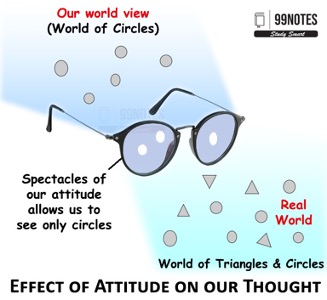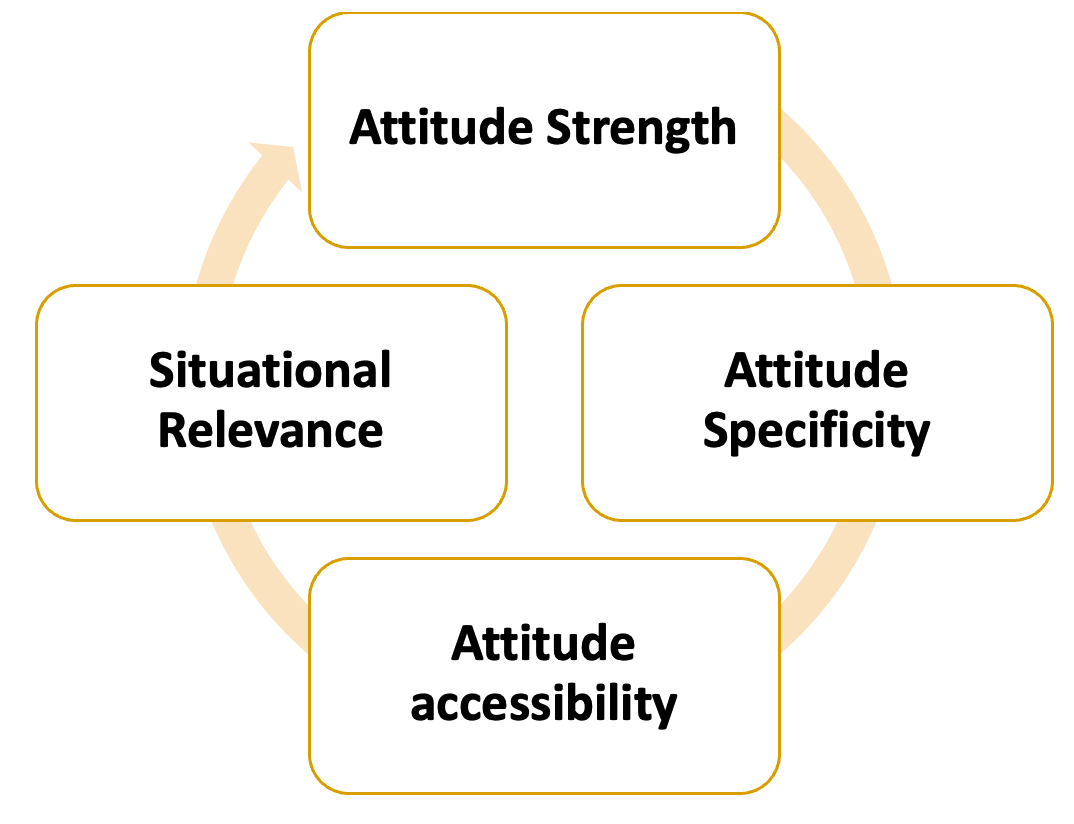Attitudes, thoughts and Behaviour
Attitude, i.e. the predisposition to react favourably or unfavourably towards the attitude object, manifests itself through thoughts and Behaviour. In the previous articles, we learned about attitude. In this article, we shall understand its impact on thought and behaviour.
Relation between Attitude and Thoughts:
Thought refers to a host of ‘conscious’ mental activities that are ‘cognitive’ in nature.
- Here, the term conscious refers to intentional mental processes to exclude processes like hallucination from the definition of thought.
- The term ‘Cognitive’ signifies the mental process of acquiring knowledge.
Impact of attitude on thought
Attitude plays two important roles for humans that we have learned in previous articles, which shapes our thought:
- Attitude has a knowledge function: It helps us organise our worldview and gives a degree of a meaningful, stable, clear picture of the reality around us. All new knowledge that we gain through experience reaches us only if it fits into our worldview.
- Attitudes have an ego-defensive function: It defends us from conceding basic truths about ourselves or the harsh realities of life. It, thus, helps us in defending our reality from the wide variety of views in the world.
This impact of attitude on our thoughts has been well understood by various philosophers, such as:
- David Hume: He says that our rationality (power of reasoning) is a slave of our passions. It means that our emotions and attitudes shape how we think.
- Immanuel Kant: According to him, our process of understanding things is subjective, shaped by the concepts already known to us. Whatever we see is coloured by the lens of our existing understanding. Thus, we can never see the world in its true form.
Attitude thus shapes our worldview. We can understand this with the help of the following example.
Relation between Attitude and Behaviour:
Behaviour, in psychology, refers to the potency of an individual (or group) to respond to external or internal stimuli. Attitude and behaviour are closely related but slightly distinct.
Behaviour(B) = Attitude (A) X Environment(E)
- Generally, it is observed that a person’s Behaviour can be predicted by the beliefs and feelings he holds towards the attitude object.
- It has also been observed that a person’s attitude can be known by observing his/her behaviour.
- Also, a person’s attitude can also be changed by changing their Behaviour.
We shall see each of these relations in this article.
Distinction between Attitude and Behaviour
Both attitude and Behaviour are object-oriented, i.e. both are oriented towards something. However, attitude is the tendency to act, whereas Behaviour deals with a reaction in a certain situation.
| Attitude | Behaviour | |
| Definition | It is the tendency or predisposition to act in response to a stimulus. | It is the potency or expressed capacity to act in response to a stimulus. It is the expression of our attitude. |
| Origin | It is learned through observation. | It is shaped primarily by our attitude but is influenced by the situations and surroundings. |
| Endurance | Attitude itself is enduring and accompanies us always in every situation. | But, attitude might not always lead to Behaviour. A person might have a positive attitude towards rock climbing but still might not choose to behave like a climber. |
Behaviour and attitudes influence each other greatly. Therefore, we will study this relationship between the attitude and Behaviour in two broad dimensions:
- Attitude that influences and guides behaviour;
- Behavior that influences the attitude.
Attitude guiding and influencing Behaviour:
Attitude has the greatest influence on our Behaviour. Attitude is our most innate tendency to act in a certain situation. These tendencies might remain suppressed due to various situational constraints, but in our most natural form, we tend to act according to our attitude.
For Example, suppose someone has a positive attitude towards singing. In that case, the person is likely to behave or act in line with the attitude – either they will learn to sing themselves, watch the singing reality show, or even support the contestant.
However, the relationship between attitude and Behaviour is not always so consistent. Attitude does not necessarily extract the exact Behaviour.
For Example, an individual can have a negative attitude toward drinking, but they can still engage in drinking under peer pressure. Thus, this leads to inconsistency between the two.
From the above example, it is clear that not all attitudes are equally likely to be reflected in our Behaviour. The presence of certain variables which determine the degree to which attitude influences Behaviour are:
1. Attitude Strength:
Attitude strength refers to the degree to which an attitude has influence over our behaviour. The stronger the attitude held, the more consistent the attitude behaviour link.
- Stronger Attitudes are developed through direct exposure to the attitude object.
- Those attitudes towards which we are not sure and don’t come to mind quickly and regularly are weak attitudes.
- For Example, if our tendency to eat junk food is greater than our tendency to eat healthy food, then our attitude towards junk food can be considered stronger.
2. Attitude Specificity:
We can increase the chances that an attitude will lead to consistent behaviour is to making sure that the attitude is more specific than general. Specific attitudes are more accurate predictors of behaviour than general attitudes.
- For Example, a person might have a negative attitude towards war but still have a stronger positive attitude towards war with a specific country.
3. Attitude Accessibility:
Attitude accessibility is how quickly an attitude comes to the mind. The more accessible the attitudes, the more likely it is that they will dominate our awareness.
- Accessibility is assumed to depend on the strength of the associative link in memory between the representation of the object and the evaluation of the object: The stronger the memory link between the object and its evaluation, the more quickly the attitude will come to mind.
- For Example, if someone sees a rat, they might have a very quick “yuck” response.The fast, yucky response indicates an accessible attitude toward the rat. They do not have to think about whether they like rats; rather, the mere presence of a rat results in the activation of their attitude.
4. Attitude Relevance:
If an attitude is not relevant in any particular situation, then it is unlikely to influence his Behaviour. The greater the vested interest for an individual, the stronger the attitude behaviour link will be.
- For Example, if a person is truly honest and still lies to children to go to sleep, a ghost will Here, making a child go to bed is more relevant than honesty.
In conclusion, we can say that certain variables influence the attitude-behaviour relation in our social interactions.
However, the relation between attitude and Behaviour is more dynamic since not only change in attitude bring a change in Behaviour, but a change in Behaviour of people can also change their attitude.
Importance of Situation in deciding Behaviour
We have already seen that attitude is not the only factor in deciding our behaviour. Depending on the situation, our behaviour might differ vastly. We can understand this using the following formula.
Behaviour(B) = Attitude (A) X Environment(E)
The two most important situational factors that affect our behaviour are:
1. Self-monitors:
- Social-monitors are personality traits that refer to the differences among people in allowing social situations to influence their actions.
- People with low self-monitoring have weak attitude-behaviour relations, and they act against their previously held attitude. They allow the social situation to influence their Behaviour.
- For Example, a person can criticise loud music in public places, which indicates his negative attitude toward this loud music. However, at his/her own house party, he/she opts to play loud music to get along with the guests.
- On the other hand, there are people with high self-monitors, and they do not allow the social situation to influence their Behaviour.
- For Example, if a person holds a negative Attitude for drinking personally, then, even under peer pressure, he would not drink.
2. Socially acceptable standards:
- People can hold attitudes that are not socially acceptable, so they tend to behave differently than what their attitude tells them to do.
- For Example, a person can have a negative attitude towards persons of different communities, but still, he/she does not act in that way because it is socially unacceptable.
We shall learn more about the impact of society on our behaviour in the article, Social Influence.
Behaviour influencing the attitude:
Sometimes, Behaviour also influences attitude. This means that a change in Behaviour, in turn, can change the attitude that a person holds for the attitude object.
Generally, it is only the attitude that influences behaviour. However, attitude can also be changed by changing someone’s behaviour.
For Example:
- The Swachh Bharat mission forced a change in behaviour that led to increased use of toilets and has built a more positive attitude towards cleanliness.
- People generally had a negative attitude towards wearing seatbelts while driving. The government has made wearing seatbelts mandatory by the Motor Vehicles Act. As wearing seat belts became mandatory, over the years, people have developed a positive attitude towards wearing seat belts.
- The motive of campaigns like Selfie with Daughter is to change the attitude of people towards girl child by changing the Behaviour of parents towards their daughters.
Thus, attitude and Behaviour have a co-relation but not a causation relation. A person can hold a particular attitude but still can choose not to behave accordingly. On the other hand, repeated behaviour can also change a person’s attitude. So, this is a complex relationship that varies from person to person.




